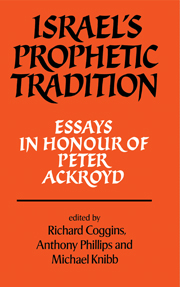Book contents
- Frontmatter
- Contents
- Preface
- Biographical note
- Abbreviations
- Note
- Prophecy in the ancient Near East
- The origins of prophecy in Israel
- Three classical prophets: Amos, Hosea and Micah
- The Isaiah tradition
- An alternative prophetic tradition?
- Visionary experience in Jeremiah
- The Ezekiel tradition: prophecy in a time of crisis
- The prophets of the restoration
- Prophecy and the emergence of the Jewish apocalypses
- Prophecy and wisdom
- Prophecy and the cult
- Prophecy and law
- A change of emphasis in the study of the prophets
- Martin Buber and the interpretation of the prophets
- Index of Biblical References
Three classical prophets: Amos, Hosea and Micah
Published online by Cambridge University Press: 09 January 2010
- Frontmatter
- Contents
- Preface
- Biographical note
- Abbreviations
- Note
- Prophecy in the ancient Near East
- The origins of prophecy in Israel
- Three classical prophets: Amos, Hosea and Micah
- The Isaiah tradition
- An alternative prophetic tradition?
- Visionary experience in Jeremiah
- The Ezekiel tradition: prophecy in a time of crisis
- The prophets of the restoration
- Prophecy and the emergence of the Jewish apocalypses
- Prophecy and wisdom
- Prophecy and the cult
- Prophecy and law
- A change of emphasis in the study of the prophets
- Martin Buber and the interpretation of the prophets
- Index of Biblical References
Summary
Who were these impressive men whom we call the writing prophets, and how did they understand their task? Did they proclaim a message that was substantially new, or were they steeped in old Israelite traditions, which they interpreted in a new way? What was the quintessence of their message? Modern research has not reached unanimity in answering these and similar questions, and it would be presumptuous to claim that a satisfying solution to all the intricate problems posed by classical Israelite prophecy could be given here. Nevertheless, by way of introduction to a review of recent research on the books of Amos, Hosea and Micah, a few remarks are appropriate on classical Israelite prophecy in general.
I cannot subscribe without qualification to the position of liberal and pietistic Protestantism, which looked upon the classical prophets as individualists and in particular as religious personalities who rejected the institutions of their era in favour of a spiritual and personal piety. This type of approach anachronistically projected back the personal views of the scholar into the prophetic message. On the other hand, however, the modern traditio-historical and form-critical approach stands in jeopardy of overstating the prophetic commitment to old Israelite traditions and institutions at the expense of the tremendous personal experience of God to which these men bear witness; cf. Amos 7: 15; Hos. 1: 3; Isa. 6; Mic. 2: lla (cf. below, p. 49); 3: 8 (Henry, 1969). We should therefore constantly keep in mind von Rad's famous dictum that the problems raised at the turn of the century need to be re-examined, though with clearly different historical and theological presuppositions.
- Type
- Chapter
- Information
- Israel's Prophetic TraditionEssays in Honour of Peter R. Ackroyd, pp. 32 - 57Publisher: Cambridge University PressPrint publication year: 1982

